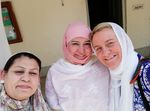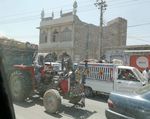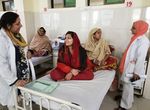Postcard from Pakistan: June 2019
←
→
Page content transcription
If your browser does not render page correctly, please read the page content below
Postcard from Pakistan: June 2019
What an incredible life this is! That is how I feel most of the time. When I was in my late teens, I
didn’t know what I wanted to do when I grew up. All I knew was that it had to be something with
people, travel and languages. Little did I know that nearly 30 years later, I would be still living my
dream, but not in any way I could have imagined back then.
This week I have been travelling the length and breath of Pakistan working on gender-based
violence. My work has meant I have been meeting the most amazing people doing incredible work
supporting women who experience violence. People from the government, UN agencies, NGOs
and the doctors and nurses who first meet the women as she seeks medical care for whatever
violent situation she has come from.
In Pakistan, like many countries across the world, gender-based violence is common. 28% of
women age 15-49 have experienced physical violence. A shocking 42% of women and 40% of
men consider wife beating justifiable under specific circumstances (for instance not having a
dinner cooked). Another commonly held belief is that it is women’s role to serve men. Deeply held
beliefs together with cultural norms mean violence is accepted by both men and women. 400-year
old traditional practices such as Swara or Vani are still widespread in some provinces - the
practice of giving girls for marriage as compensation to settle crimes such as murder, adultery or
death. Child marriage is still common and arranged marriage is still the norm across the country.
Abortion is illegal unless in the case of a married women for health reasons. It is illegal for an
unmarried women to have an abortion, no matter what the situation.
Gender-based violence is a public health issue, a social issue, a human rights issue. Most women
who do end up seeing a doctor for injuries do not tell the doctor about violence and lie about the
cause of their injuries. Self-stigma, shame and fear of further violence means it remains hidden.
Those lucky enough to be supported by well-trained doctors, who do disclose the violence, often
plead with the doctor not to record violence on the medical report. For the small minority that wish
to report the violence, the police procedure is laborious. They can be actively discouraged to take
it further and are often openly blamed for causing the violence. Most claims do not make it to the
court and of those that do, convictions are rare.
There is also hope - doctors and nurses are being trained on how to support and care for survivors
of violence. Together with the government, many UN and development agencies are working with
communities, doctors, police and lawyers to sensitise and educate them about the importance of
respect and rights, and make sure they have the skills needed to support the women. Advocacy is
strong for the introduction of laws that protect the rights of women and improvements are being
made. Communities themselves are challenging gender norms and traditional practices, and with
1the support of the government, change is happening - slowly. Much remains to be done from
education of communities, training of health, police and legal professionals, changing of laws,
improvement of court systems and ensure safety and security for women survivors of violence and
their children.
Travelling in an armoured car, I started my work in KP province
on the border of Afghanistan – the province of Ms Malala, the
brave young and inspiring Pakistani woman whose activism for
human rights is known worldwide . I spoke with many doctors and
nurses about the challenges they face in supporting women who
have experienced violence. A very conservative province where
security risk is at the highest, I joined my women friends in
wearing the traditional Shalwar Kameez and covered my head in
colourful scarves each day. In 42 degree heat, this was an
interesting experience but extremely well regarded by all the men
and women I met. What I noticed when we arrived in the province was the absence of women. No
women on the streets, in cars, or motorbikes. Learning quickly, I noticed that only men shake the
hands with other men – women do not shake hands with men. In such a conservative society,
there is much separation starting the airport with different security check lines, women only floors
in the hotel, lady-specific times in the hotel swimming pool. It works like a secret society and I can
see how it feels both like separation on the one hand, and how it creates connection between
women and I’m guessing between men.
Moving to Lahore, a modern bustling city, women are much more visible from the moment I
arrived at the airport. Some women are not wearing traditional clothes and
men are wearing suits and shirts. However, in the crowded government
hospitals, the same issues are present for women survivors of violence.
Families fill up the corridors outside the wards waiting for their loved ones.
There is often no walking space in the
corridors. In the women’s ward,
women share 2-3 to one bed. I spoke
to some of the women who were
being treated for various pregnancy-
related issues, two women sitting
cross-legged on the same bed –
strangers apart from their shared bed
and care.
2I met many young passionate and highly skilled women doctors. I got to hang
out with one particular group of women obstetricians taking a
training on gender-based violence and women’s
reproductive health and rights. Huge energy in the group,
huge commitment and lots of fun – I see more and more
how people are the same the world over – kind, caring
and fed by purpose and connection.
In one exchange with a beautiful women doctor, she
expressed her feelings of worthlessness, of low confidence
and of feeling that other doctors felt she was less than
because she came from a poor province. She spent her life
trying to prove she was good enough. We sat together and questioned a belief she was holding
strongly – “I’m not good enough” using the Work of Byron Katie. A short exchange, it was
incredible to see how she dropped into herself deeply realising how she reacted, how she lived her
life when she believed the thought – how much stress, anxiety it caused her and most of all how
much she was not able to be her true uncensored self. Exploring for the first time, without the
thought “I’m not good enough” she was able to connect with her powerful self and feel free and
peaceful – the power of believing our thoughts…. From beliefs about ourselves like I’m not good
enough to beliefs about women being there to serve men – in my experience, freedom lies in
questioning these beliefs.
During my time in Pakistan, alongside the women, I worked with
some really inspirational men who are leading the response to
gender-based violence, passionate and committed to changing
the situation for women. I was reminded of my own wonderful
family doctor growing up in Ireland who himself was Pakistani. I
experienced a very warm welcome everywhere I went. When I
mentioned that I drink a lot of tea in Ireland, I was informed that
in Pakistan, drinking 24 cups a day would not be uncommon.
Needless to say, a lot of tea was consumed this week!
So, what do I want to be when I grow up as I’m still growing – same as when I was a teenager
people, travel, languages – with the addition of connection and service – what a gift to live and
love this life.
Nadine Ferris France, Lahore, 29 June 2019
www.nadineferrisfrance.com
Note: permission was granted for all photos where people are identifiable
3You can also read























































